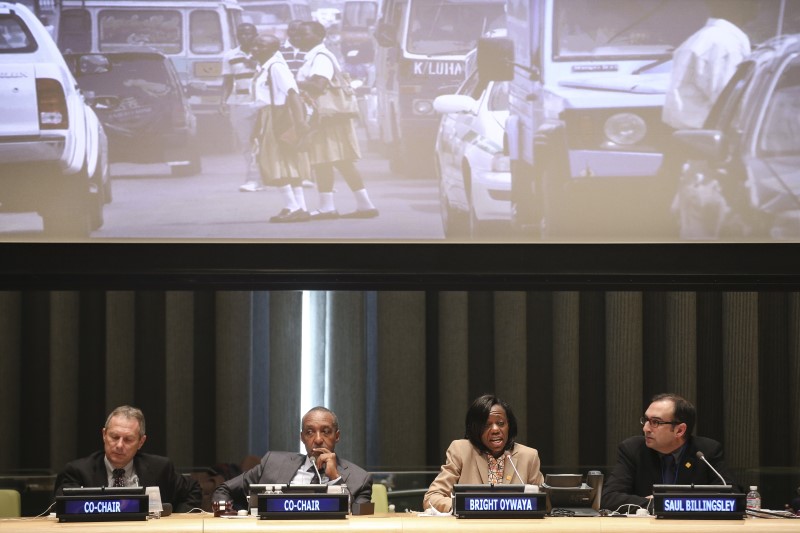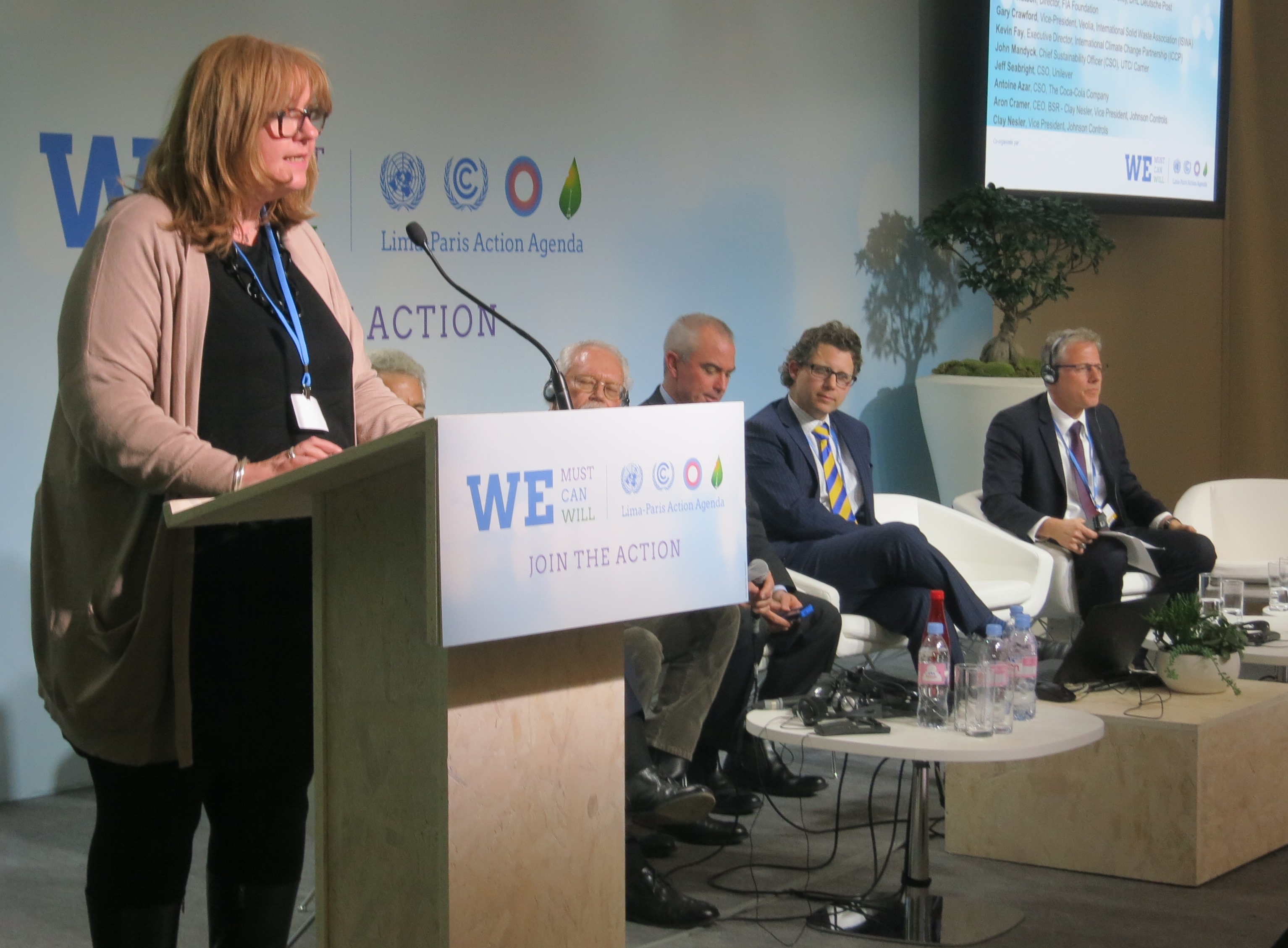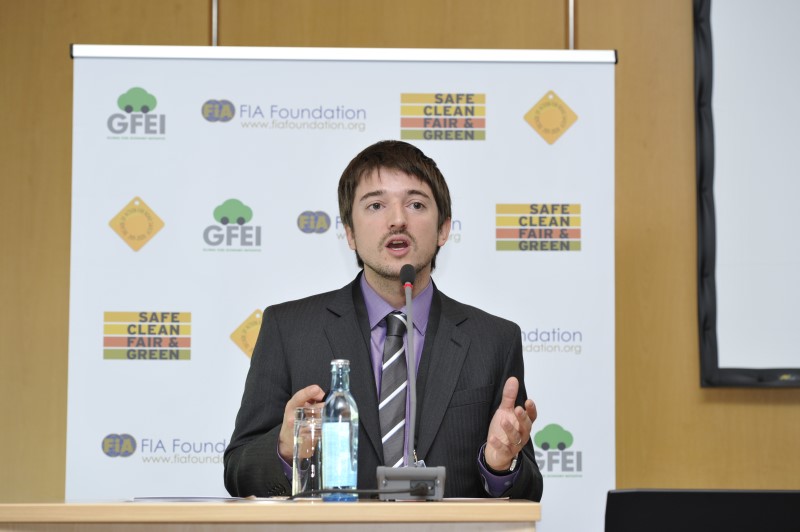Safe, Clean, Fair and Green agenda leads UN Post-2015 Hearing

The ‘Safe, Clean, Fair and Green’ agenda for post-2015 sustainable transport has been presented to the United Nations at the Open Working Group on the Sustainable Development Goals on 7 January 2014.
Saul Billingsley, Acting Director General of the FIA Foundation, made the opening presentation to the UN’s Open Working Group (OWG), the body of governments designated by the UN General Assembly to propose a set of Sustainable Development Goals (SDGs). The Open Working Group convened at UN headquarters for a day of discussions dedicated to sustainable transport.
A four member top panel comprising the two Co-Chairs of the OWG, the Permanent Representative of Kenya to the UN and the Permanent Representative of Hungary to the UN along with Saul Billingsley and Bright Oywaya of the Association of the Physically Disabled of Kenya, opened the UN session.
Saul Billingsley called on UN member states to restore the human dimension to transport policy in the post-2015 development goals. He said:
“There is a fundamental, and often fatal, disconnect when transport efficiency is calculated only according to narrow economic criteria. When it forgets or neglects the human dimension. An all too typical example is road building and rehabilitation designed to increase vehicle volume and speed, without considering the wider or long-term safety or environmental impacts.
So our objective for the post-2015 agenda should be to restore the human dimension to transport policy, to design transport systems that do no harm, and to integrate transport policies with wider development objectives in a way that supports the delivery of the new sustainable development goals.”
He urged the UN to include the kind of targets set out in the Safe, Clean, Fair and Green agenda for post-2015 sustainable mobility.
These are 2030 targets which have also been reflected in the main briefings prepared for the Open Working Group by UN agencies and partners. They include a global target for halving road traffic deaths as proposed by the Commission for Global Road Safety; doubling urban access to mass transit; bringing an additional 1.5 billion urban residents within WHO air quality thresholds; and following the work of the Global Fuel Economy Initiative, doubling the fuel efficiency of new vehicles.
Sheila Watson, Executive Secretary of the Global Fuel Economy Initiative (GFEI) and Director of Environment for the FIA Foundation also spoke. In her intervention to the Open Working Group she urged the UN to include a target to double vehicle fuel economy in the Post-2015 Development Goals. Following the initial session with the Open Working Group Co-Chairs, Lew Fulton of the Institution of Transportation Studies at the University of California, Davis and a key partner on the GFEI addressed all Member States of the UN Open Working Group on the range of proposed sustainable transport targets.
Bright Oywaya who has been campaigning with Make Roads Safe for a post-2015 road injury target, had been selected by NGOs along with Saul Billingsley to lead the input into the transport session of the Open Working Group.
She said:
“We have the knowledge, the data and the solutions to ensure that transportation can serve as a powerful enabler of the post-2015 objectives – to eradicate poverty, to ensure equitable growth and people-centred development. Clear, compelling targets as in the overarching ‘Safe, Clean, Fair and Green,’ agenda presented this morning, can and must be integrated into the post-2015 Goals. Millions of lives and livelihoods depend upon it, as does the future of my country and other developing nations.”
Bright Oywaya highlighted the Share the Road project of the UN Environment Programme and FIA Foundation as an example of an initiative which could contribute to the objectives of the Sustainable Development Goals. She said: “Share the Road is an approach which prioritises safety and sustainability, providing cross-cutting benefits: for health tackling road injury, obesity and non-communicable diseases; for the environment promoting non-motorised and public transport to tackle congestion and emissions; and for access to employment and services.”
Following the main Open Working Group session, the FIA Foundation’s Saul Billingsley spoke at a side event organised by the Partnership on Sustainable, Low Carbon Transport (SLoCaT), alongside Dr Joan Clos, Executive Director of UN HABITAT, and Nikhil Seth, Director of Sustainable Development at the UN Department of Social and Economic Affairs. The event launched the draft Results Framework on Sustainable Transport. The FIA Foundation has contributed to the Results Framework which covers targets on Urban Access, Rural Access, Road Safety, Air Pollution and Human Health, and on Climate Change.
The FIA Foundation also organised a side event with the UN Environment Programme focusing in more detail on the Safe, Clean, Fair and Green agenda. Representing the UNEP was Arab Hoballah Chief of the Sustainable Consumption and Production Branch in the Division of Technology, Industry and Economics of UNEP. Also speaking was Cornie Huizenga, Joint Convener of the Sustainable Low Carbon Transport Partnership. Saul Billingsley and Sheila Watson also spoke on behalf of the FIA Foundation.
Presentations to the UN Post-2015 Hearing
Saul Billingsley >
Bright Oywaya >
Lew Fulton >





